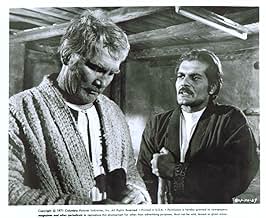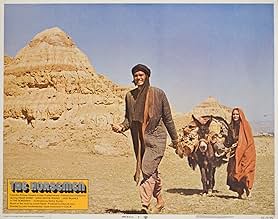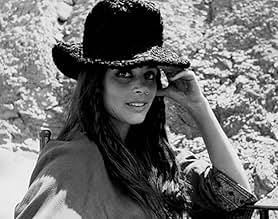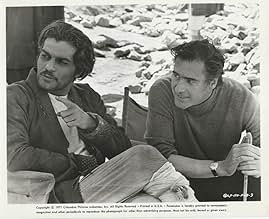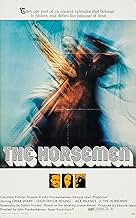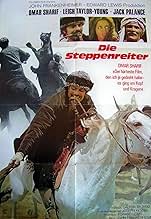CALIFICACIÓN DE IMDb
6.2/10
1.4 k
TU CALIFICACIÓN
Drama que describe la vida rural en el Afganistán contemporáneo y la afición del pueblo afgano a un antiguo deporte tradicional similar al polo a caballo.Drama que describe la vida rural en el Afganistán contemporáneo y la afición del pueblo afgano a un antiguo deporte tradicional similar al polo a caballo.Drama que describe la vida rural en el Afganistán contemporáneo y la afición del pueblo afgano a un antiguo deporte tradicional similar al polo a caballo.
- Dirección
- Guionistas
- Elenco
Salmaan Peerzada
- Salih
- (as Salmaan Peer)
Aziz Resham
- Bacha to Ghulam
- (as Aziz Resh)
Vida St. Romaine
- Gypsy Woman
- (as Vida St Romaine)
Florencio Amarilla
- Arabian Man
- (sin créditos)
Ishaq Bux
- Amjad Kahn
- (sin créditos)
Carlos Casaravilla
- Messenger
- (sin créditos)
- Dirección
- Guionistas
- Todo el elenco y el equipo
- Producción, taquilla y más en IMDbPro
Opiniones destacadas
The Horsemen could have been better, and I was expecting to be bowled over considering the talent there is. It's still however a very decent and interesting film, with its best assets being excellent.
When it comes to how The Horsemen looks, it's in this area where the film excels the most. The magnificent Afghanistan scenery, with its breath-taking sunsets and serene mountain views for examples, are done justice by the colourfully sweeping but also gritty photography, with its frequent use of beautiful aerial shots. The lushly romantic and (at other points) also appropriately brassy music score compliments the mood perfectly and the buzkashi scenes are relentlessly brutal(a warning this is not for the faint-hearted) as well as very compelling.
John Frankenheimer's direction, while not the best he has ever done is restrained while not undermining any tension when it's needed. The characters are interesting and the interplay between them often is quite real, these are not 'likeable' characters by all means(never were they meant to be) but the development and interplay was well done it was easy to care for them. The acting is well above average on the most, with a more restrained than usual but very commanding, eerie and actually also very moving performance of Jack Palance faring best. His make-up is believable too. Leigh Taylor-Young plays her role very sympathetically.
For all these good qualities however, The Horsemen has a few failings. One problem being the script, which has some naturally contemplative and poetic moments but also too many moments of silliness and awkwardness. A good atmosphere is maintained throughout and much of the film is very passionate and emotionally affecting, but the story for my tastes did drag sometimes and felt a little choppy structurally. Omar Sharif(from personal opinion) has also given better performances, it's certainly better than his stiff performance is the badly miscalculated Che Guevara biopic Che(which coincidentally also had Palance in one of his worst performances), but the performance here is a bit one-note and of one expression, Sharif spends most of the time looking very grim and not much of anything else.
All in all, a decent film with some truly excellent things, but also could have been great if other important components were done stronger. 6.5/10 Bethany Cox
When it comes to how The Horsemen looks, it's in this area where the film excels the most. The magnificent Afghanistan scenery, with its breath-taking sunsets and serene mountain views for examples, are done justice by the colourfully sweeping but also gritty photography, with its frequent use of beautiful aerial shots. The lushly romantic and (at other points) also appropriately brassy music score compliments the mood perfectly and the buzkashi scenes are relentlessly brutal(a warning this is not for the faint-hearted) as well as very compelling.
John Frankenheimer's direction, while not the best he has ever done is restrained while not undermining any tension when it's needed. The characters are interesting and the interplay between them often is quite real, these are not 'likeable' characters by all means(never were they meant to be) but the development and interplay was well done it was easy to care for them. The acting is well above average on the most, with a more restrained than usual but very commanding, eerie and actually also very moving performance of Jack Palance faring best. His make-up is believable too. Leigh Taylor-Young plays her role very sympathetically.
For all these good qualities however, The Horsemen has a few failings. One problem being the script, which has some naturally contemplative and poetic moments but also too many moments of silliness and awkwardness. A good atmosphere is maintained throughout and much of the film is very passionate and emotionally affecting, but the story for my tastes did drag sometimes and felt a little choppy structurally. Omar Sharif(from personal opinion) has also given better performances, it's certainly better than his stiff performance is the badly miscalculated Che Guevara biopic Che(which coincidentally also had Palance in one of his worst performances), but the performance here is a bit one-note and of one expression, Sharif spends most of the time looking very grim and not much of anything else.
All in all, a decent film with some truly excellent things, but also could have been great if other important components were done stronger. 6.5/10 Bethany Cox
Not having seen this film since its initial release, I have vague moments of recollection (I was eleven at the time) but, after all these years, I still remember this film, a few scenes-even the theater where I saw it-so that has to count for something. We, my parents, and myself went to many, many movies so it was not unusual for me to come along, even at decidedly adult fair such as this. My mother had a crush on Omar-notwithstanding that they share the same passion for bridge. Frankenheimer had a good reputation for producing and directing interesting, offbeat films that hit as often as they miss-The Manchurian Candidate, Grand Prix, and Black Sunday come to mind. So, we gave this film a shot.
While I do not remember the plotline to any great extent, what I do remember quite vividly was that this film took place in Afghanistan, and features quite prominently the national sport of Buzkashi-a sport whereby riders on horses attempt to deposit the carcass of a lamb in a circle. Also, this has what is quite honestly the best performance in a film by Omar Sharif you will ever find. He plays a great rider who is injured early in the film. He broads about a lot but finally finds redemption by returning to the sport that nearly killed him for that one last ride. I do not remember if he makes it through alive.
Buzkashi is an old, old brutal sport/ritual full of tradition and ceremony. The film took great pains to present this dying spectacle as realistically as possible and is the great set piece to the film. A true Man's man sport, it is not for the fainthearted. For me, at eleven, I was not used to cinematic `realism' even though by then I had seen hundreds of films. Perhaps it is why I remember it so for it made quite an impression.
The film was transferred to video but is long out of print and only available through collectors. It has not made it to DVD, unfortunately. I have not seen it since it initial release.
Still, in a long career for Frankenheimer, this is a film that should not be forgotten and is probably one of his best.
While I do not remember the plotline to any great extent, what I do remember quite vividly was that this film took place in Afghanistan, and features quite prominently the national sport of Buzkashi-a sport whereby riders on horses attempt to deposit the carcass of a lamb in a circle. Also, this has what is quite honestly the best performance in a film by Omar Sharif you will ever find. He plays a great rider who is injured early in the film. He broads about a lot but finally finds redemption by returning to the sport that nearly killed him for that one last ride. I do not remember if he makes it through alive.
Buzkashi is an old, old brutal sport/ritual full of tradition and ceremony. The film took great pains to present this dying spectacle as realistically as possible and is the great set piece to the film. A true Man's man sport, it is not for the fainthearted. For me, at eleven, I was not used to cinematic `realism' even though by then I had seen hundreds of films. Perhaps it is why I remember it so for it made quite an impression.
The film was transferred to video but is long out of print and only available through collectors. It has not made it to DVD, unfortunately. I have not seen it since it initial release.
Still, in a long career for Frankenheimer, this is a film that should not be forgotten and is probably one of his best.
Omar Sharif and Jack Palance may be the only names in this cast that most will recognize but the story based on an Afghan tale, set in Afghanistan before the Russian invasion, is a classic tale which lays out a great deal of Afghan culture during the period before the great disruption by the West. Afghanistan returned to the public eye after the post-911 invasion to depose the Taliban but the state of knowledge about these marvelous independent people who fought the British Empire to a standstill, still remains obscure. The game of buzgashi, a kind of polo for Weidman, was the core for many of the tribesmen. Its importance as an institution marking the status of tribes and individuals has no real counterpart in Western culture, and this is a tale of intrigue and self-learning, framed in a cultural setting we still have yet to understand.
There is so much of interest in this compelling film, set in Afghanistan. Based on the book by Joseph Kessells, a writer of rare insight.
Centered around the ancient game of Buzkashi, played on horseback, and only in the three northern provinces of Mazar-i-Sharif, Maimana and Kataghan. [The game had it's origin in a training routine instituted by Ghengiz Khan, which both conditioned his men for warfare and provided a means of feeding his army. A very large circle was formed by his warriors and as the circle closed no animal was permitted to escape.]
There are some terrific scenes of the first "Royal Buzkashi" played on Bagrami Plain, just outside Kabul, which had been decreed by the king. Also some great footage of the country, depicting the beautiful and varied terrain encountered as Uroz makes the self-imposed and dangerous journey back to his home province in the North.
The interplay of all the characters is an education in understanding the powerful role human emotion and upbringing play in all our lives, as both Tursen(the father) and Uroz(the son) attempt to come to terms with their own harsh anger and pride. The consequences spill over and embroil other individuals in the story. The story also gives some insight into the different way of thinking engendered by the cultural mix of religion,relatively isolated living, and living in a harsh environment where survival can be pretty raw.
Contrast is drawn by the mix of ancient and modern. One such scene has Tursen (Jack Palance),who as Head of Osman Bey's stable is addressing the chopendoz,(players of Buzkashi), pauses to look upwards at a jetliner passing overhead whilst he stands on "The Roof of the World". Another takes place in the modern hospital in Kabul.
Both Palance & Sharif give of their finest, very well supported by a great character cast.
A dramatic part of the story unfolds in the Bamian Valley, where Uroz gambles & loses the very thing he later realise he loves and wants back. Historically this part of the film contains important footage of the giant Budhas that were carved into the cliffside, until deliberately destroyed by Talliban militia.
All in all, an excellent and enjoyable film and I am surprised it has not been shown on Television or re-issued on disc, as the world focussed on that area just a short time ago.
Centered around the ancient game of Buzkashi, played on horseback, and only in the three northern provinces of Mazar-i-Sharif, Maimana and Kataghan. [The game had it's origin in a training routine instituted by Ghengiz Khan, which both conditioned his men for warfare and provided a means of feeding his army. A very large circle was formed by his warriors and as the circle closed no animal was permitted to escape.]
There are some terrific scenes of the first "Royal Buzkashi" played on Bagrami Plain, just outside Kabul, which had been decreed by the king. Also some great footage of the country, depicting the beautiful and varied terrain encountered as Uroz makes the self-imposed and dangerous journey back to his home province in the North.
The interplay of all the characters is an education in understanding the powerful role human emotion and upbringing play in all our lives, as both Tursen(the father) and Uroz(the son) attempt to come to terms with their own harsh anger and pride. The consequences spill over and embroil other individuals in the story. The story also gives some insight into the different way of thinking engendered by the cultural mix of religion,relatively isolated living, and living in a harsh environment where survival can be pretty raw.
Contrast is drawn by the mix of ancient and modern. One such scene has Tursen (Jack Palance),who as Head of Osman Bey's stable is addressing the chopendoz,(players of Buzkashi), pauses to look upwards at a jetliner passing overhead whilst he stands on "The Roof of the World". Another takes place in the modern hospital in Kabul.
Both Palance & Sharif give of their finest, very well supported by a great character cast.
A dramatic part of the story unfolds in the Bamian Valley, where Uroz gambles & loses the very thing he later realise he loves and wants back. Historically this part of the film contains important footage of the giant Budhas that were carved into the cliffside, until deliberately destroyed by Talliban militia.
All in all, an excellent and enjoyable film and I am surprised it has not been shown on Television or re-issued on disc, as the world focussed on that area just a short time ago.
This is an example of taking a book and adapting it to the large screen and realising with hindsight that it works better as a book . I'm not familiar with Joseph Kessel's original novel but the comments on this page state that the film is very faithful to the book and that might be the problem . It's a story that concentrates on obsession at winning at all costs and Uraz the protagonist is a universal metaphor for all mankind that when you want to win something it can cost you very dearly
You can perhaps see why the producers thought this would make a great film with its exotic locations and the fact it was st in Afghanistan before the land reforms the mid 1970s that led to civil war and the subsequent Soviet intervention is what made me seek out the film if only to understand Afghan culture better and the film does contain an intelligent opening when the audience are led to believe they're watching a scene from the 17th Century only to the Afghan rug pulled from under their feet as a jet plane screams over head . Likewise there's some spectacular scenes involving the sport of buzkashi where horsemen literally fight over the carcass of a dead goat and there's some impressive cinematography featuring the Afghan landscape but the inherent problem with the film is the character driven narrative which doesn't kindly lend itself to the medium of cinema
You can perhaps see why the producers thought this would make a great film with its exotic locations and the fact it was st in Afghanistan before the land reforms the mid 1970s that led to civil war and the subsequent Soviet intervention is what made me seek out the film if only to understand Afghan culture better and the film does contain an intelligent opening when the audience are led to believe they're watching a scene from the 17th Century only to the Afghan rug pulled from under their feet as a jet plane screams over head . Likewise there's some spectacular scenes involving the sport of buzkashi where horsemen literally fight over the carcass of a dead goat and there's some impressive cinematography featuring the Afghan landscape but the inherent problem with the film is the character driven narrative which doesn't kindly lend itself to the medium of cinema
¿Sabías que…?
- TriviaThe film began shooting using 65mm negative (Super Panavision), but during production Columbia Pictures went through a change in management. The budgets for this and another 65mm production, El oro de Mackenna (1969), were cut and both films were forced to switch over to 35mm anamorphic Panavision. However, both were released in 70mm, with the later-shot sections blown up. In later years, the mix-and-match formats made restoration of the films more time consuming and expensive than if they'd been shot entirely in 65mm, and they were preserved in 35mm only.
- ErroresWhen Tursen (Jack Palance) has a flashback to one of his past victories, one can tell that he is swinging a phony, lightweight, stuffed goat carcass around when his horse jumps up on the mud hut.
- Citas
District Chief: What demon has possessed you to mock these good people with that piece of dog-bait?
Selecciones populares
Inicia sesión para calificar y agrega a la lista de videos para obtener recomendaciones personalizadas
- How long is The Horsemen?Con tecnología de Alexa
Detalles
- Fecha de lanzamiento
- País de origen
- Sitio oficial
- Idioma
- También se conoce como
- Konjanici
- Locaciones de filmación
- Afghanistan(Exterior)
- Productoras
- Ver más créditos de la compañía en IMDbPro
Taquilla
- Presupuesto
- USD 6,000,000 (estimado)
- Tiempo de ejecución1 hora 49 minutos
- Mezcla de sonido
- Relación de aspecto
- 2.35 : 1
Contribuir a esta página
Sugiere una edición o agrega el contenido que falta



